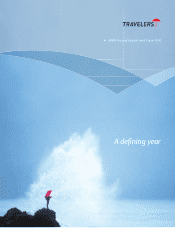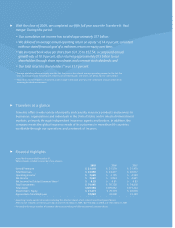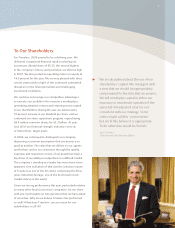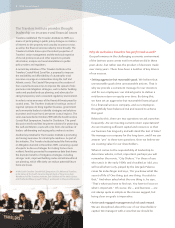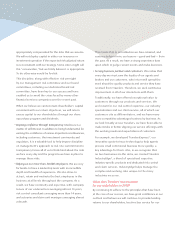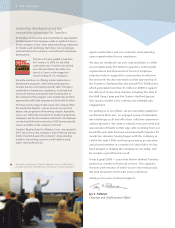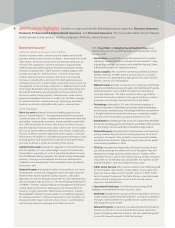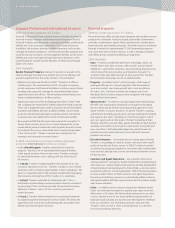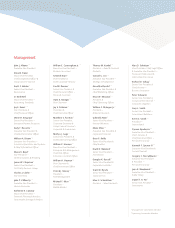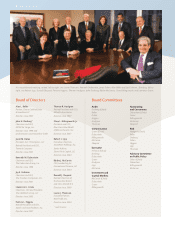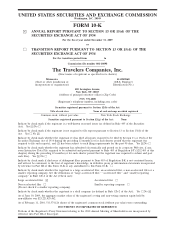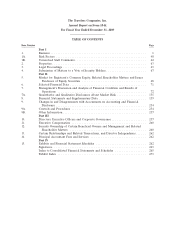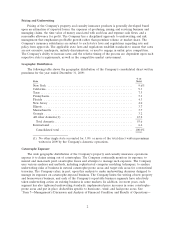Travelers 2009 Annual Report Download - page 4
Download and view the complete annual report
Please find page 4 of the 2009 Travelers annual report below. You can navigate through the pages in the report by either clicking on the pages listed below, or by using the keyword search tool below to find specific information within the annual report.
2 2009 Annual Report
Why do we believe Travelers has performed so well?
Our performance in the challenging economic environment
of the last two years comes not from what we did in these
years alone, but rather was the product of decisions made
over many years. There have been a number of key drivers
of our success.
Setting aggressive but reasonable goals.• We believe that
unreasonable goals drive unreasonable actions. That is
why we provide a consistent message for our investors
and for our employees: our stated goal is to deliver a
mid-teens return on equity over time. By doing this,
we have set an aggressive but reasonable financial goal
for a financial services company, and our employees
thoughtfully have balanced risk and reward to achieve
that goal.
Related to this, there are two questions we ask ourselves
frequently: Are we meeting current return expectations?
Are we investing sufficient capital and resources so that
our business has longevity and will stand the test of time?
We manage our company for the long-term, and if we can
answer “yes” to these two questions, then we believe we
are creating value for our shareholders.
When it comes to the responsibility of leadership to
determine what is, in fact, important, perhaps you will
remember the movie, “City Slickers.” For those of you
who saw it in the early 1990s and chuckled as I did, you
will recall when Curly, played by the late Jack Palance,
raises his index finger and says, “Do you know what the
secret of life is? One thing, just one thing. You stick to
that.” And when asked what the one thing is, he says,
“That’s what you have to find out. You have to focus on
what’s important.” Of course, life — and business — are
not always quite as simple as the movies suggest, but
being clear on goals is imperative.
Active and engaged management of risk and reward.•
We are disciplined about the use of our shareholders’
capital. We manage it with a view that we should be
At the South Carolina Coastal Risk Symposium, Eric Nelson of Travelers;
Leslie Jones of the South Carolina Department of Insurance; Joan
Woodward of The Travelers Institute; Deb Callahan of The Heinz Center;
and Charleston Mayor Joseph P. Riley Jr. participate in the panel discussion.
The Travelers Institute provides thought
leadership on insurance and financial issues
Travelers established The Travelers Institute in 2009 as a
means of participating in public policy dialogue on matters
of interest to the property and casualty insurance sector,
as well as the financial services industry more broadly. The
Travelers Institute draws upon the industry expertise of
Travelers’ senior management and the technical expertise
of its risk professionals and other experts to provide
information, analysis and recommendations to public
policy makers and regulators.
A current key initiative of The Travelers Institute is the
Travelers Coastal Wind Zone Plan, a proposal to improve
the availability and affordability of catastrophic wind
insurance coverage in communities along the Gulf and
Atlantic coasts. The Coastal Plan proposes the creation of
four coastal hurricane zones to improve the spread of risk;
promotes risk mitigation strategies, such as better building
codes and prudent land use planning; and advocates for
rating transparency and a consistent regulatory environment.
In order to raise awareness of the financial threats posed to
coastal areas, The Travelers Institute is hosting a series of
regional symposia to bring together business, government
and community leaders to identify strategies and solutions
to protect and insure hurricane-prone coastal regions. The
series was launched in October 2009 with the South Carolina
Coastal Risk Symposium, hosted in Charleston. The panel
discussion reinforced that long-term solutions for protecting
the Gulf and Atlantic coasts will come from a broad base of
leaders collaborating and urging policy makers to action.
Another key initiative for The Travelers Institute is promoting
and raising awareness for catastrophe readiness. As part of
this initiative, The Travelers Institute hosted the Partnership
on Mitigation Summit in December 2009, convening a panel
of experts to discuss strategies for making homes more
resilient. Panelists presented loss experience data that shows
the dramatic benefits of mitigation strategies, including
stronger roofs, improved building codes and enhanced land
use planning, which effectively can reduce potential future
hurricane losses.

